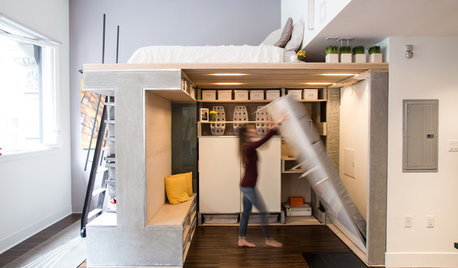Euros Won't Stay Down Without Light
crazyforworms
10 years ago
Related Stories

REMODELING GUIDESYou Won't Believe What These Homeowners Found in Their Walls
From the banal to the downright bizarre, these uncovered artifacts may get you wondering what may be hidden in your own home
Full Story
SMALL SPACESHouzz TV: You Won’t Believe Everything This Tiny Loft Can Do
Looking for more floor space, a San Francisco couple hires architects to design a unit that includes beds, storage and workspace
Full Story
SMALL SPACES10 Tiny Kitchens Whose Usefulness You Won't Believe
Ingenious solutions from simple tricks to high design make this roundup of small kitchens an inspiring sight to see
Full Story
KIDS’ SPACES7 Kids’ Bedroom Decor Ideas That Won’t Break the Bank
Take an economical approach to decorating your child’s room with these DIY ideas
Full Story
BUDGET DECORATING15 Summery Decorating Ideas That Won't Break the Bank
Transport yourself seaside with a bit of paint or a few airy accessories
Full Story
Houzz Products: Get a Whole New Look — Without New Furniture
With a fresh-looking decor trio (rug, light fixture, wall covering), they won’t even notice that same-old sofa
Full Story
HEALTHY HOMEGet Cleaner Indoor Air Without Opening a Window
Mechanical ventilation can actually be better for your home than the natural kind. Find out the whys and hows here
Full Story
BATHROOM DESIGNWindows That Expose Your Bathroom to Light Without Exposing You
Enjoy the best of both worlds with window tricks that give you privacy along with the views and natural light
Full Story
DECORATING GUIDES12 Ways to Cool Your Home Without Air Conditioning
If your summer energy bill is leaving you hot under the collar, consider these savvy alternate strategies for cooling down
Full Story
KITCHEN DESIGNStay Cool About Picking the Right Refrigerator
If all the options for refrigeration leave you hot under the collar, this guide to choosing a fridge and freezer will help you chill out
Full StorySponsored
Custom Craftsmanship & Construction Solutions in Franklin County
More Discussions






Niivek
chuckiebtoo
Related Professionals
Eden Prairie Landscape Architects & Landscape Designers · Horsham Landscape Architects & Landscape Designers · Zion Landscape Architects & Landscape Designers · Aberdeen Landscape Contractors · Gloucester Landscape Contractors · Tustin Landscape Contractors · Waipahu Landscape Contractors · Whittier Landscape Contractors · Genesee Stone, Pavers & Concrete · Belleville General Contractors · Fremont General Contractors · Mobile General Contractors · Parkersburg General Contractors · Rancho Cordova General Contractors · West Babylon General ContractorscrazyforwormsOriginal Author
chuckiebtoo
equinoxequinox